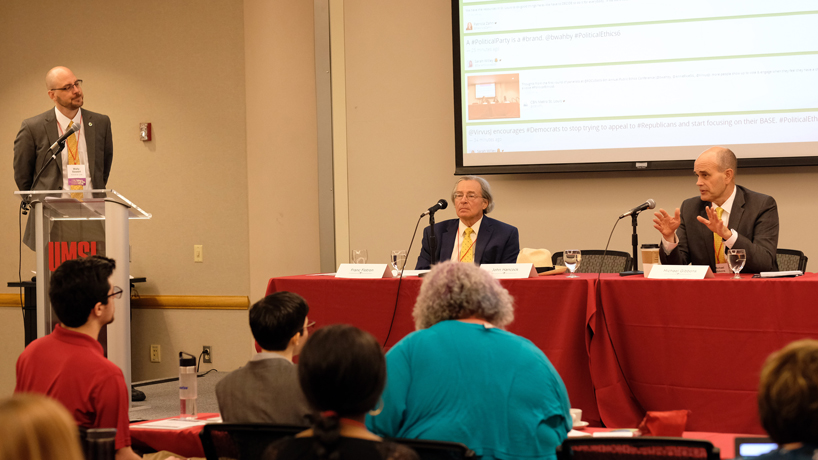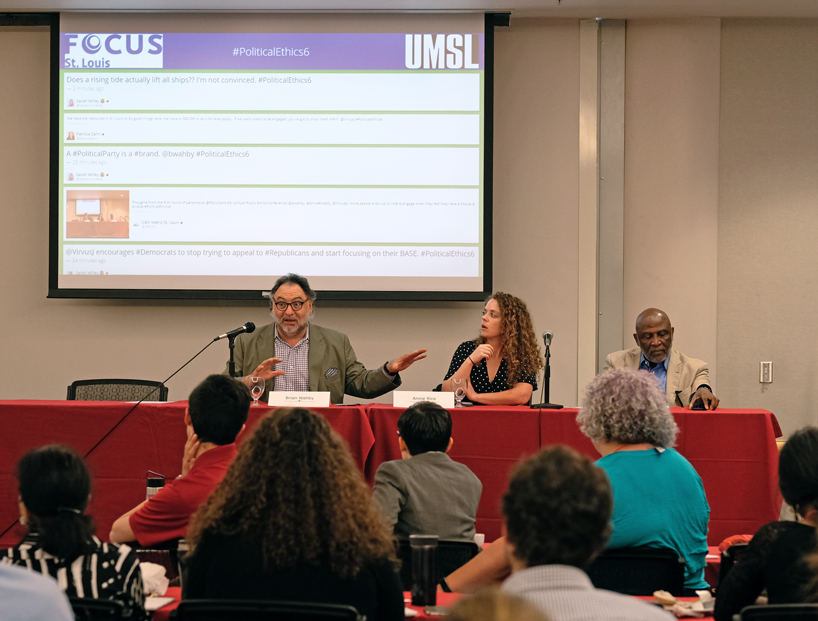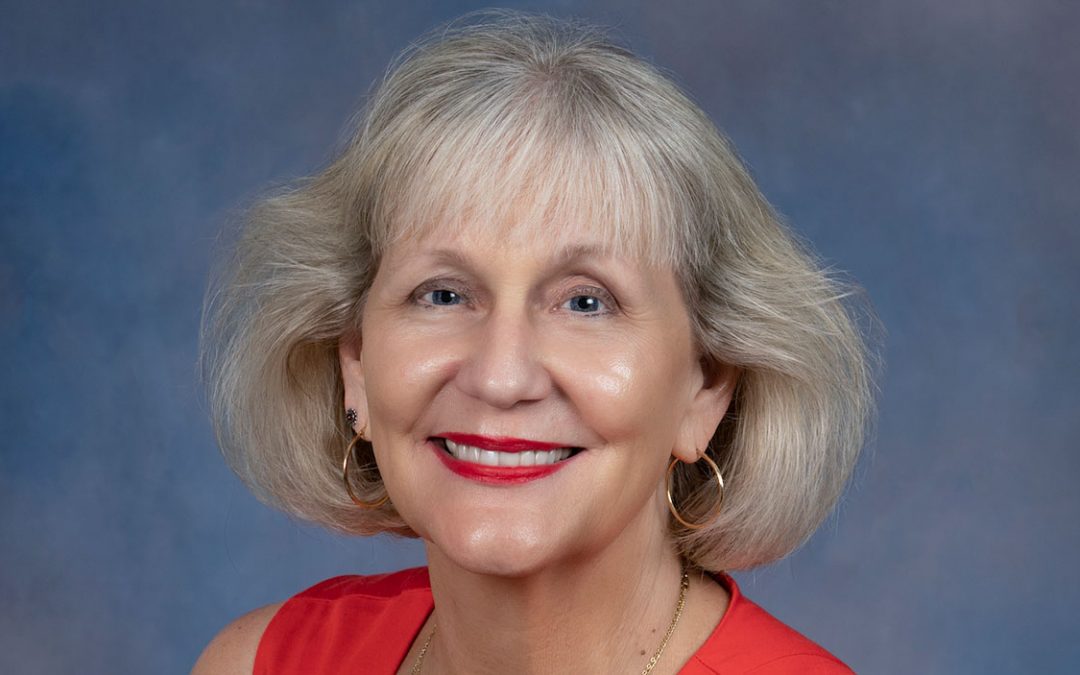
Former President Pro Tem of the Missouri Senate Michael Gibbons (at right) speaks during a panel on “One Party in Power: Legislative Republicans” as part of the Public Ethics Conference Thursday at the Millennium Student Center. Wally Siewert (at left) moderated the event and two-term State Senator Franc Flotron joined Gibbons on the panel. (Photos by August Jennewein)
When Franc Flotron approaches elected officials, he typically provides an advance warning.
“I tell them I hate both parties,” the Missouri lobbyist and former Republican state senator said. “The universal response I get is that they hate both parties too, which is interesting and a real serious problem.”
The internal frustrations from Republicans and Democrats alike seem to span from municipal primaries to presidential elections. A variety of these concerns were addressed Thursday at the University of Missouri–St. Louis.
A co-host of the sixth annual Public Ethics Conference, UMSL served as the backdrop as current and former elected officials discussed some of the complex issues surrounding America’s major political parties.
Through panel discussions and open dialogue, conference participants addressed the level of control parties should have over candidates, financial resources and policy decisions.
Wally Siewert, director of civic engagement for FOCUS St. Louis, opened the day by noting the idea for the conference theme, “Leadership, Ethics and Political Parties,” came to him following conversations about the 2016 presidential election.
From Democrats, he fielded concerns about the legality of superdelegates. From Republicans, he heard about attempted back room deals aimed at avoiding the candidacy of some presidential hopefuls.
These cries from inside both parties made him question if representatives from either group were serious about forming laws to regulate how parties structure their internal decisions.
“Political parties occupy a legal and constitutional gray area,” Siewert said. “They are neither private nor public. They are semi-public institutions. They started out as private organizations but our legal history has a long tradition of regulating them because they have been entrusted with filling certain public duties, including, of course, the selection of candidates.”
The conference, co-hosted by FOCUS St. Louis and Missouri Humanities Council, also focused on how political parties change in regions where one party has a lock on power. This case is true in the City of St. Louis, where Democrats have a monopoly on public office, and in the Missouri capital, where Republicans hold the governorship as well as majorities in the Senate and House of Representatives.

Former and current political figures (from left) Brian Wahby, Annie Rice and Virvus Jones outline the challenges and opportunities facing the Democratic Party in the City of St. Louis during the first morning panel.
During the opening panel focused on the Democratic Party in St. Louis, representatives pondered if changing policy in the city meant first changing the party.
“Politics within the party and in St. Louis specifically have really been driven by personalities, gaining political power and the role of patronage,” said Brian Wahby, former chair of the St. Louis City Democratic Central Committee. “That’s played a much bigger role than policy. A lot of times, policy decisions are thrown away.”
Current Alderwoman Annie Rice said she believed the board was moving in the right direction, pointing to the election of three independents to the Board of Aldermen, including herself.
“That means you had at least three campaigns that were run on issues and personalities as well,” Rice said. “I think the structure is changing.”
Virvus Jones, a former St. Louis alderman, assessor and comptroller, expressed uncertainty about the unity of the party and equity in the legislation it passes.
He said resource distribution and many policies do not fairly benefit black constituents, particularly those in north St. Louis. He pointed to the limited amount of tax increment financing in north St. Louis compared to the rest of the city as an example.
“When you have people in a certain area of the city that have been neglected and disaffected for years, you don’t have a party problem, you have a people that are elected problem,” Jones said.
The frustration of party systems carried into the second panel with former Republican state legislators.
Party involvement in primary elections was a contested topic, with Flotron mentioning instances when parties blocked candidates from running. He pointed to recent cases in Missouri with State Rep. Courtney Curtis, a Democrat who attempted to file for the 14th Senatorial District, and presiding Christian County Commissioner Ray Weter, a Republican who hoped to retain his post as commissioner.
“I think if parties are going to keep their relevance, they have got to radically alter what their mission is,” Flotron said. “I will also say that government has some real responsibility to make sure that the two parties – at least as they are structured – are not a filter that prevents a lot of people from getting on the ballot and limiting the choices for voters.”
Michael Gibbons, former president pro tem of the Missouri Senate, said the Republican party had little influence in primary elections during his political experience, but he also noted that low voter turnout in primaries gives parties and special interest groups a concerning amount of power.
“To the extent that we are descending into an era of identity politics and tribalism, I think that primarily happens from the way districts are drawn and interest groups knowing they have a limited number of people to contact in primaries and hopefully fielding a candidate who is much more to their liking and push the conversation as far to the right as they can,” Gibbons said.
The conference also brought in national thought leaders in former Oklahoma Congressman Mickey Edwards and Daraka Larimore-Hall, the vice chair of the California Democratic Party Labor Caucus.
Edwards, who delivered the keynote address, is the author of “The Parties Versus the People: How to Turn Republicans and Democrats into Americans.” In the book, Edwards argues that current partisan battles undermine democracy and discourage compromise.
Larimore-Hall, the co-founder of political consulting firm Modern Action Strategies, provided the keynote response. His academic research focuses on the role political parties, social movements and activism play in creating a more participatory democratic society.














